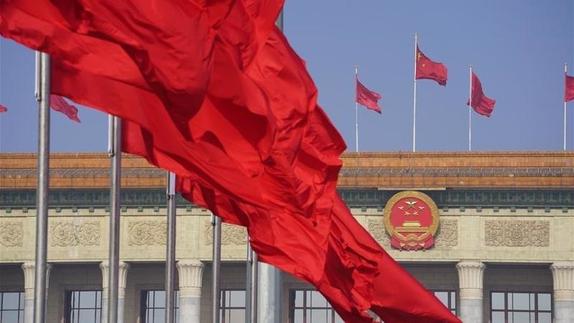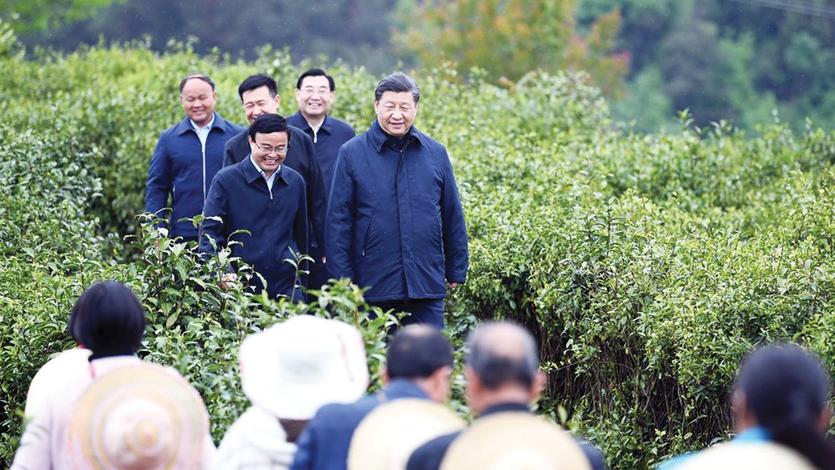 This photo dated May 22, 2020 shows flags of China on the Tian'anmen Square and atop the Great Hall of the People in Beijing, capital of China. (XING GUANGLI / XINHUA)
This photo dated May 22, 2020 shows flags of China on the Tian'anmen Square and atop the Great Hall of the People in Beijing, capital of China. (XING GUANGLI / XINHUA)
Chinese people's satisfaction and trust in the century-old Communist Party of China has been on the rise, driven by the Party leading the country in fighting the COVID-19 pandemic and eliminating extreme poverty, according to reports and analysts.
Earlier this month, an image circulated online moved many netizens. Three epidemic-control workers dressed in white protective suits were seen in a fast-moving vehicle carrying medical supplies into driving wind and rain along a street in Guangzhou, Guangdong province's capital, which was recently hit by a new outbreak of COVID-19.
A red Party flag attached to the vehicle fluttered above the workers' heads, its bright color standing out in the dim light.
The image was taken by a resident in Liwan district, a high-risk area where the first locally transmitted case was reported in the latest outbreak, on June 2. He shared it on the microblogging service Sina Weibo and wrote: "In the rainstorm, it is you who carry this flag to charge to the front. Pay tribute to the heroes in harm's way."
Many netizens commented that the Party flag made them feel at ease. One wrote, "The Party flag always flutters high on the front line", and another commented "At critical moments, Party members will surely step up."
A survey conducted by the University of California's China Data Lab showed support for Chinese government among the Chinese public has risen, with the average level of trust in the central government increasing from 8.23 in June 2019 to 8.87 in May last year, measured on a scale of one to 10
The Party's flag is reassuring to the Chinese people, especially after the strong leadership shown by Party organizations in implementing epidemic control measures beginning last year, and the arduous efforts of millions of Party members to eradicate absolute poverty in China.
A survey conducted by the University of California's China Data Lab showed support for the government among the Chinese public has risen, with the average level of trust in the central government increasing from 8.23 in June 2019 to 8.87 in May last year, measured on a scale of one to 10.
When respondents were asked whether they preferred living under China's political system compared with others, the percentage of respondents who preferred China's system increased from 70 percent to 83 percent over the same period.
A long-term Harvard University survey released last year found that Chinese citizens' satisfaction with the Party and the government has increased across the board, with the central government receiving a strong level of approval of 93 percent in 2016, the end of the survey period.
From the impact of broad national policies to the conduct of local town officials, Chinese citizens rate the government as more capable and effective than ever before, according to the report from the Ash Center for Democratic Governance and Innovation under the Harvard Kennedy School.
"The most striking feature of our survey's data since 2003 is the near universal increase in Chinese citizens' average satisfaction toward all four levels of government," the authors said in the report.
The independent survey drew on in-person interviews with more than 31,000 individuals from urban and rural areas between 2003 and 2016 to offer a look at how ordinary Chinese citizens felt about the government.
These trends are likely continuing today, Edward Cunningham, one of the authors of the report and director of the Ash Center China Programs at the Harvard Kennedy School, said in an article published by the Christian Science Monitor in February.
He cited the handling of the COVID-19 outbreak as an example, and said as the central government engaged in lockdowns and the situation improved, satisfaction with its actions had increased and spread to views of local governments.
ALSO READ: COVID-19 herd immunity feasible in China, experts say
A survey of 5,865 people issued last month by the Chinese Academy of Social Sciences' China Anti-Corruption Research Center showed 96 percent of respondents were satisfied with the epidemic control work. Over 90 percent said the government demonstrated good transparency and adjustment of policies to suit actual conditions were effective, according to the survey conducted in the second half of last year.
Zhang Wanhong, executive director of the Institute for Human Rights Studies at Wuhan University, said: "As a resident of Wuhan, I feel that people's satisfaction with the Party has been greatly improved, especially after the country resumed social stability after the big test of the epidemic and took the lead in realizing economic recovery. The Party is highly resilient and able to adapt to developments and meet different challenges."
Zhang recalled when the outbreak happened in Wuhan, Hubei province. Faced with the unprecedented epidemic, the Party and government quickly summed up what measures were necessary, including organizing community-level prevention and control and using big data to assess the crisis.
The Chinese government's epidemic prevention and control measures were successful as it adhered to the concept of putting life first and providing fair treatment, Zhang said. "People's feeling of gratitude toward the Party is genuine and simple because their lives and interests have been well protected," he said.
 President Xi Jinping inspects poverty alleviation work in a tea farm in Laoxian township, Pingli county of Northwest China’s Shaanxi province on April 21, 2020. (YAN YAN / XINHUA)
President Xi Jinping inspects poverty alleviation work in a tea farm in Laoxian township, Pingli county of Northwest China’s Shaanxi province on April 21, 2020. (YAN YAN / XINHUA)
Prosperous lives
The Party's people-centered approach is also reflected in its commitment to improving living standards and promoting equality. Last year, China accomplished its goal of eliminating extreme poverty and entered a new development stage.
The Harvard survey said Chinese citizens reported that the government's provision of healthcare, welfare and other essential public services was by 2016 far better and more equitable than when the survey began in 2003. People in poorer and inland regions were more likely to report increases in satisfaction, resulting from the provision of basic services.
The life of Peng Xiaying, 53, a resident of Shenshan, a village located in the mountains of Jinggangshan, Jiangxi province, has improved dramatically in the past few years under poverty relief policies.
A long-term Harvard University survey released last year showed Chinese citizens reported that the government's provision of healthcare, welfare and other essential public services was by 2016 far better and more equitable than when the survey began in 2003. People in poorer and inland regions were more likely to report increases in satisfaction, resulting from the provision of basic services
The village had poor infrastructure, and the villagers walked on dirt roads and lived in adobe houses. Women from outside the village were discouraged from marrying Shenshan men to avoid a life of poverty.
Peng's household used to be one of the poorest in the village, and the family mainly relied on her to earn a meager income from farming due to her husband's disability.
In 2015, the local government arranged targeted poverty relief projects in Shenshan and helped villagers develop tea and yellow peach industries. They also built a parking lot, installed streetlights and helped the villagers renovate their houses.
With the help of the government, development of the tourism industry and more visitors, Peng opened the first homestay in the village with her husband in 2016.The guests eat at the homestay and often buy handmade bamboo baskets and chopsticks, which help the family earn about 110,000 yuan ($17,200) a year.
"Now every household has its own business. Some make snacks, some sell handicrafts and local products. With the government's support and our own hard work, I believe the future will be more beautiful," she said.
Better images
The Harvard report showed that Chinese grassroots officials were viewed as kind and knowledgeable problem solvers who were concerned with the difficulties of ordinary people and not just talking about them. They were far less likely to be beholden to the wealthy or concerned about their own interests, the survey found.
The Chinese Academy of Social Sciences report also said 80 percent of respondents believed that all or most of the problems reported to the government could be solved, that officials were fair in handling subsistence allowances, and it was easier for them to interact with the government.
Zhang, from Wuhan University, said the Party is made up of individual members and grassroots officials. Party members had demonstrated a good image to the public through their efficient and orderly work, despite risks and pressure.
He said residents in Wuhan had formed a stronger bond with community staff members who cared for residents, especially senior citizens who live alone.
"When my university campus was quarantined last year, volunteers who are Party members worked on the front line. They patrolled the campus, delivered meals and daily necessities to residents," he recalled.
"The Party won the hearts of the people because of its people-centered philosophy; governing for, and depending on the people," Zhang said. "The Chinese people are increasingly aware that the Party cares about their interests, which is different from many political parties in the West."
In March, while responding to a question regarding ruling legitimacy in China during a video interview, Elizabeth J. Perry, the Henry Rosovsky Professor of Government at Harvard University and Director of the Harvard-Yenching Institute, said that the only people who can really answer the question are the Chinese people themselves. Legitimacy is a right to rule and it's the people who decide whether their government has a right to rule, she said.
All of the public opinion polls which have asked Chinese people how they feel about various policies and government at different levels have, in general, come back with "a very rosy picture", she said.
READ MORE: Cultural program celebrates 100th anniversary of the Party
"They (Chinese people) seem to feel on the whole satisfied that their government is basically looking out for the interests of the Chinese people and the Chinese nation," she said.


